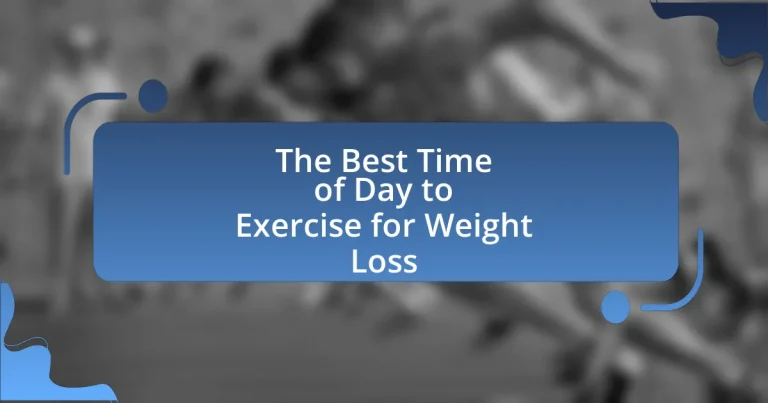The article focuses on determining the best time of day to exercise for weight loss, highlighting that morning workouts are generally more effective due to enhanced fat oxidation and improved metabolic rates. It discusses the significance of timing in relation to metabolic fluctuations throughout the day, the influence of circadian rhythms on exercise performance, and the varying benefits of morning, afternoon, and evening workouts. Additionally, the article reviews scientific studies that support the advantages of specific exercise times, factors influencing individual preferences, and practical tips for optimizing workout schedules to achieve weight loss goals.

What is the Best Time of Day to Exercise for Weight Loss?
The best time of day to exercise for weight loss is generally in the morning. Research indicates that morning workouts can enhance fat oxidation and improve metabolic rates throughout the day. A study published in the Journal of Obesity found that individuals who exercised in the morning lost more weight compared to those who worked out later in the day, likely due to increased adherence to exercise routines and better dietary choices throughout the day.
Why is timing important for weight loss during exercise?
Timing is important for weight loss during exercise because it influences metabolic rate and hormonal responses. Research indicates that exercising at specific times can enhance fat oxidation and improve overall energy expenditure. For instance, a study published in the Journal of Obesity found that individuals who exercised in the morning experienced greater fat loss compared to those who worked out later in the day, likely due to increased insulin sensitivity and metabolic efficiency during morning hours. Additionally, aligning exercise with circadian rhythms can optimize performance and recovery, further supporting weight loss efforts.
How does the body’s metabolism change throughout the day?
The body’s metabolism fluctuates throughout the day, primarily influenced by circadian rhythms, hormonal changes, and activity levels. Metabolic rate tends to be higher in the morning due to increased cortisol levels, which promote energy utilization. As the day progresses, metabolism generally slows down, particularly in the evening when insulin sensitivity decreases and the body prepares for rest. Research indicates that metabolic processes are optimized for energy expenditure during daylight hours, with studies showing that individuals may burn more calories in the morning compared to the evening. This pattern underscores the importance of timing in exercise for weight loss, as engaging in physical activity during peak metabolic hours can enhance fat burning and overall energy expenditure.
What role does circadian rhythm play in exercise effectiveness?
Circadian rhythm significantly influences exercise effectiveness by affecting physical performance, metabolism, and recovery. Research indicates that individuals tend to perform better in physical activities during their peak circadian phases, typically in the late afternoon or early evening, when body temperature and hormone levels are optimized for strength and endurance. A study published in the Journal of Sports Sciences found that strength and aerobic performance can be enhanced by aligning exercise with these natural biological rhythms, leading to improved outcomes in weight loss and fitness goals.
What are the different times of day people typically exercise?
People typically exercise at three main times of day: morning, afternoon, and evening. Morning workouts are popular due to increased energy levels and the potential for better adherence to a routine, as studies show that individuals who exercise in the morning are more consistent. Afternoon sessions often benefit from peak body temperature and muscle function, which can enhance performance. Evening workouts can be advantageous for those who prefer to relieve stress after a long day, with research indicating that strength and endurance may be higher later in the day.
What are the benefits of morning workouts for weight loss?
Morning workouts enhance weight loss by boosting metabolism and promoting fat oxidation. Engaging in physical activity early in the day can increase the number of calories burned throughout the day due to elevated metabolic rates. Research published in the Journal of Obesity indicates that individuals who exercise in the morning tend to adhere to their workout routines more consistently, leading to greater long-term weight loss success. Additionally, morning workouts can improve mood and energy levels, which may encourage healthier food choices throughout the day, further supporting weight loss efforts.
How do afternoon workouts compare to morning sessions?
Afternoon workouts generally provide enhanced performance and strength compared to morning sessions. Research indicates that body temperature is higher in the afternoon, which can lead to improved muscle function and increased strength output. A study published in the Journal of Strength and Conditioning Research found that individuals who exercised in the afternoon demonstrated better endurance and strength gains than those who worked out in the morning. Additionally, afternoon workouts may align better with the body’s natural circadian rhythms, potentially leading to more effective weight loss outcomes.
What advantages do evening workouts offer for weight loss?
Evening workouts offer several advantages for weight loss, primarily due to increased energy levels and enhanced performance. Research indicates that individuals often experience peak physical performance in the evening, which can lead to more intense workouts and greater calorie expenditure. A study published in the Journal of Strength and Conditioning Research found that strength and endurance are typically higher in the evening compared to morning sessions, allowing for more effective workouts. Additionally, evening exercise can help reduce stress and improve sleep quality, both of which are beneficial for weight management. Improved sleep has been linked to better metabolic health and weight loss, as highlighted in research from the American Journal of Clinical Nutrition. Therefore, evening workouts can be particularly effective for those aiming to lose weight.

How does exercise timing affect weight loss results?
Exercise timing significantly affects weight loss results, as studies indicate that exercising in the morning can enhance fat oxidation and improve adherence to workout routines. Research published in the Journal of Obesity found that individuals who exercised in the morning experienced greater weight loss compared to those who worked out later in the day, likely due to increased energy expenditure and better metabolic responses. Additionally, morning exercisers often report higher consistency in their routines, which is crucial for long-term weight management.
What scientific studies support specific exercise times for weight loss?
Research indicates that exercising in the morning may be more effective for weight loss compared to other times of the day. A study published in the journal Obesity by Chtourou and Souissi (2012) found that morning exercise can enhance fat oxidation and improve metabolic responses. Additionally, a study in the Journal of Clinical Endocrinology & Metabolism by Kline et al. (2015) demonstrated that individuals who exercised in the morning had better adherence to their workout routines, leading to greater long-term weight loss. These findings suggest that specific exercise times, particularly morning sessions, can significantly support weight loss efforts.
What were the findings of recent research on exercise timing?
Recent research on exercise timing indicates that morning workouts may enhance fat loss more effectively than evening sessions. A study published in the journal “Obesity” by researchers at the University of California, Los Angeles, found that individuals who exercised in the morning experienced greater reductions in body fat compared to those who worked out later in the day. The study involved a controlled trial where participants engaged in similar exercise regimens but at different times, revealing that morning exercisers had improved metabolic responses and adherence to their fitness routines. This evidence supports the notion that timing can play a significant role in optimizing weight loss outcomes.
How do these findings apply to different demographics?
The findings on the best time of day to exercise for weight loss apply differently across demographics such as age, gender, and lifestyle. For instance, research indicates that younger individuals may benefit more from morning workouts due to higher energy levels and metabolism rates early in the day, while older adults might find afternoon or evening sessions more suitable for flexibility and joint health. Additionally, studies show that women often experience better weight loss results when exercising in the morning, as hormonal fluctuations can impact energy levels and fat utilization. Furthermore, individuals with demanding work schedules may prefer evening workouts, which can lead to increased adherence to exercise routines. These variations highlight the importance of tailoring exercise timing to individual demographic factors for optimal weight loss outcomes.
How does individual preference influence the best time to exercise?
Individual preference significantly influences the best time to exercise, as personal factors such as energy levels, daily schedules, and psychological readiness dictate optimal workout times. Research indicates that individuals who align their exercise routines with their natural circadian rhythms—whether they are morning or evening people—tend to experience better performance and adherence to their fitness plans. A study published in the Journal of Sports Sciences found that morning exercisers reported higher levels of consistency and motivation compared to those who preferred evening workouts, highlighting the importance of personal preference in establishing a sustainable exercise routine.
What factors should individuals consider when choosing their workout time?
Individuals should consider their personal energy levels, schedule flexibility, and workout goals when choosing their workout time. Research indicates that energy levels fluctuate throughout the day, with many people experiencing peak performance in the late afternoon or early evening due to increased body temperature and hormone levels. Additionally, aligning workout times with personal schedules can enhance consistency, as studies show that regularity is crucial for weight loss success. Lastly, specific goals, such as fat loss or muscle gain, may benefit from targeted timing; for instance, morning workouts can boost metabolism for the day ahead.
How can personal schedules impact exercise consistency?
Personal schedules significantly impact exercise consistency by determining the availability of time for physical activity. When individuals have rigid or unpredictable schedules, they often struggle to allocate specific times for exercise, leading to irregular workout patterns. Research indicates that people who integrate exercise into their daily routines, such as scheduling workouts at consistent times, are more likely to maintain a regular exercise habit. A study published in the Journal of Physical Activity and Health found that individuals who planned their workouts were 50% more likely to adhere to their exercise routines compared to those who did not schedule their activities. Thus, personal schedules play a crucial role in establishing and maintaining exercise consistency.

What practical tips can help optimize exercise timing for weight loss?
To optimize exercise timing for weight loss, individuals should consider exercising in the morning, as studies indicate that morning workouts can enhance fat oxidation and improve metabolic rates throughout the day. Research published in the Journal of Obesity found that participants who exercised in the morning experienced greater weight loss compared to those who worked out later in the day. Additionally, maintaining a consistent exercise schedule can help regulate circadian rhythms, which may further support weight loss efforts.
How can one create a personalized workout schedule for weight loss?
To create a personalized workout schedule for weight loss, one should assess individual fitness levels, preferences, and goals. This involves determining the frequency of workouts, selecting appropriate types of exercises (such as cardio and strength training), and scheduling sessions at times that align with personal energy levels and daily routines. Research indicates that consistency is key for weight loss; therefore, a schedule that incorporates at least 150 minutes of moderate-intensity aerobic activity per week, along with two days of strength training, is effective. Additionally, studies show that exercising at the same time each day can enhance adherence to the routine, making it easier to achieve weight loss goals.
What strategies can help maintain motivation for morning workouts?
To maintain motivation for morning workouts, setting clear goals and establishing a consistent routine are essential strategies. Clear goals provide direction and a sense of purpose, while a consistent routine helps to form a habit, making it easier to wake up and exercise. Research indicates that individuals who set specific, measurable goals are more likely to achieve them, as outlined in the study by Locke and Latham (2002) in the “American Psychologist,” which emphasizes the effectiveness of goal-setting in enhancing performance. Additionally, preparing workout gear the night before and scheduling workouts like important appointments can further reinforce commitment, as it reduces barriers to starting the workout.
How can one effectively transition to evening workouts if preferred?
To effectively transition to evening workouts, one should gradually adjust their schedule by shifting workout times later in the day, starting with small increments. This method allows the body to adapt to the new routine without overwhelming it. Research indicates that exercising in the evening can lead to improved performance and increased strength due to higher body temperatures and hormone levels, which peak later in the day. Additionally, maintaining consistency by setting a specific time for workouts and creating a pre-workout routine can reinforce this new habit.
What common challenges arise with exercising at different times of day?
Exercising at different times of day presents common challenges such as energy levels, motivation, and scheduling conflicts. Morning workouts may be hindered by fatigue and stiffness, as the body requires time to wake up and reach optimal performance levels. Afternoon sessions can face interruptions from work or social commitments, while evening workouts might conflict with family time or lead to difficulties in winding down before sleep. Research indicates that circadian rhythms influence physical performance, with some studies suggesting that strength and endurance peak in the late afternoon (Chtourou & Souissi, 2012, Journal of Sports Science and Medicine). Thus, the time of day can significantly impact exercise effectiveness and adherence.
How can one overcome fatigue associated with morning workouts?
To overcome fatigue associated with morning workouts, individuals should prioritize adequate sleep, maintain proper hydration, and consume a balanced pre-workout meal. Research indicates that adults require 7-9 hours of sleep for optimal performance and recovery, which directly impacts energy levels during morning exercise. Additionally, staying hydrated is crucial, as even mild dehydration can lead to increased fatigue. A pre-workout meal rich in carbohydrates and protein can provide the necessary energy and nutrients to fuel the body, enhancing performance and reducing feelings of fatigue.
What solutions exist for managing time constraints for evening workouts?
To manage time constraints for evening workouts, individuals can implement strategies such as scheduling workouts in advance, utilizing high-intensity interval training (HIIT) for efficiency, and preparing workout gear beforehand. Scheduling workouts ensures commitment, as research indicates that planning increases adherence to exercise routines. HIIT, which can yield significant benefits in shorter durations, allows for effective workouts in as little as 20-30 minutes, making it suitable for busy schedules. Additionally, preparing workout clothes and meals in advance minimizes time spent on logistics, enabling a quicker transition to exercise. These solutions collectively enhance the likelihood of maintaining a consistent evening workout routine despite time limitations.


